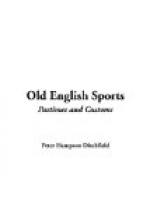Tournaments—Mysteries—Mor
alities—Pageants.
In the days of chivalry, when gallant knights used to ride about in search of adventures; and when there were many wars, battles, and crusades, martial exercises were the chief amusements of the people of England. We have already mentioned some of these sports in which the humbler folk used to show their strength and dexterity, and now I propose to tell you of those wonderful trials of military skill called tournaments, which were the favourite pastimes of the noblemen and gentry of England in the middle ages, and afforded much amusement to their poorer neighbours who flocked to see these gallant feats of arms. Tournaments were fights in miniature, in which the combatants fought simply to exhibit their strength and prowess. There was a great deal of pomp and ceremony attached to them. The lists, as the barriers were called which inclosed the scene of combat, were superbly decorated, and surrounded by pavilions belonging to the champions, ornamented with their arms and banners. The seats reserved for the noble ladies and gentlemen who came to see the fight were hung with tapestry embroidered with gold and silver. Everyone was dressed in the most sumptuous manner: the minstrels and heralds were clothed in the costliest garments; the knights who were engaged in the sports and their horses were most gorgeously arrayed. The whole scene was one of great splendour and magnificence, and, when the fight began, the shouts of the heralds who directed the tournament, the clashing of arms, the clang of trumpets, the charging of the combatants, and the shouts of the spectators, must have produced a wonderfully impressive and exciting effect upon all who witnessed the strange spectacle.
The regulations and laws of the tournament were very minute. When many preliminary arrangements had been made with regard to the examination of arms and helmets and the exhibition of banners, &c., at ten o’clock on the morning of the appointed day the champions and their adherents were required to be in their places. Two cords divided the combatants, who were each armed with a pointless sword and a truncheon hanging from their saddles. When the word was given by the lord of the tournament, the cords were removed, and the champions charged and fought until the heralds sounded the signal to retire. It was considered the greatest disgrace to be unhorsed. A French earl once tried to unhorse our King Edward I. when he was returning from Palestine, wearied by the journey. The earl threw away his sword, cast his arms around the king’s neck, and tried to pull him from his horse. But Edward put spurs to his horse and drew the earl from the saddle, and then shaking him violently, threw him to the ground.




